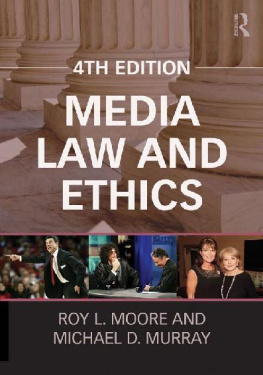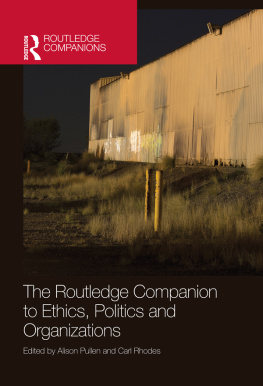First published 2004 by Westview Press
Published 2018 by Routledge
711 Third Avenue, New York, NY 10017, USA
2 Park Square, Milton Park, Abingdon, Oxon OX14 4RN
Routledge is an imprint of the Taylor & Francis Group, an informa business
Copyright 2004 by Taylor & Francis
All rights reserved. No part of this book may be reprinted or reproduced or utilised in any form or by any electronic, mechanical, or other means, now known or hereafter invented, including photocopying and recording, or in any information storage or retrieval system, without permission in writing from the publishers.
Notice:
Product or corporate names may be trademarks or registered trademarks, and are used only for identification and explanation without intent to infringe.
A Cataloging-in-Publication data record for this book is available from the Library of Congress.
Typeface used in this text: Bembo
ISBN 13: 978-0-8133-4161-3 (pbk)
"To do good is noble, but to teach others to
be good is nobler and no trouble."
Mark Twain
There were two predictable reactions whenever we mentioned we were writing a book on congressional ethics. "Oxymoron," was the most frequent reaction to the term "congressional ethics." The runner-up was, "it must be a short book." Evidently, folks still don't think too highly of Congress, although judging from the regularity with which they vote for incumbents, they continue to harbor great affection for the individual lawmakers who represent them. Americans resist change, even as they grow more cynical about politics.
The truth will take a long time to catch up with reality: that lawmakers are more honest and more ethical today than ever before. That doesn't mean that they are inherently better people or that "faith-based" politics has raised them to a new level of virtue. The fact is that our current environment has become more transparent, more partisan, and more focused on ethics. This new era of "Glass Houses" has made politicians more sensitive to ethical lapses; with so much out in the open, what they fear most of all is a picture of themselves on the front page of the morning newspapers. Any doubters can easily find a list of what lawmakers can and cannot do in the thick rule books governing ethical behavior published by the House and the Senate. Members of Congress often request advance approval from the ethics committees when they are uncertain.
Many thanks go to all the people who helped us understand the complex field of congressional ethics and who so generously shared their insights, knowledge, time, and experience. The book focuses on data compiled from a variety of primary and secondary sources, including interviews with former and current members of Congress, scholars, journalists, lawyers, and lobbyists. All direct quotes in the text that are not cited in the endnotes are drawn from these interviews and include Nan Aron, Richard Baker, Robert Bennett, Tony Blankley, Stanley Brand, Howard Berman, Rex Brown, Pat Choate, Byron Dorgan, Nadia Fam, Barney Frank, Stuart Oilman, Newt Gingrich, Howell Heflin, Marcy Kaptur, Carl Levin, Chuck Lewis, Andrew Maguire, Mark Mansfield, Howard Metzenbaum, David McIntosh, Bob Packwood, Robert Pear, Alan Platt, John Rohr, Gary Ruskin, Michael Seyfert, Louise Slaughter, Jacob Stein, Robert Torricelli, Leroy Towns, Tim Weiner, and Jim Wright.
Susan's professional home at the School of Public Policy at George Mason University has been very supportive in a number of ways. Her students in a course in Ethics and Public Policy have critiqued drafts of selected chapters, with a sharp eye to readability and content; several of the papers from these classes have found their way into the text. A grant from the Provost's office paid for research assistance, as did another grant from the School of Public Policy. Many thanks to Dean Kingsley Haynes, Provost Peter Steams, Senior Associate Dean James Finkelstein, and Vice Provost Christopher Hill for making these resources possible.
At George Mason University, Susan's research assistant, Kenneth Cox, did a superb job tracking down leads, checking facts, and reading successive drafts of the manuscript. He became a whiz at computer research, employing the same skills and indefatigability that made him such a successful captain of a nuclear submarine in his earlier career in the U.S. Navy: diligence, integrity, and patience. Jennifer Arnold, administrative assistant at the School of Public Policy, worked hard and cheerfully at the onerous task of meeting deadlines.
Many of our friends, colleagues, and relatives read the manuscript in a short time and were especially helpful in offering their criticisms, They are Nan Aron, Linda Cashdan, Pat Choate, Adam Clymer, Robert Dallek, Al Eisele, Martha Kessler, Connie L. McNeely, Robert Pear, James P. Pfiffner, Richard Reeves, John Rohr, Donna Shalala, Paul Simon, Charles Tolchin, and Karen Tolchin Vance.
We are also grateful to our editor, Leo Wiegman, for his vision of the book, close attention to detail, and incisive editing. Melissa R. Root, who copyedited the book, also did a splendid job and provided us with valuable editorial suggestions.
Many thanks, too, to our agent, John Wright, for his continued dedication, persistence in getting the best out of us, and steadfast good humor.
This book is dedicated to Dr. Mila Chernick, a great physician and close family friend.
Susan J. Tolchin
Martin Tolchin












